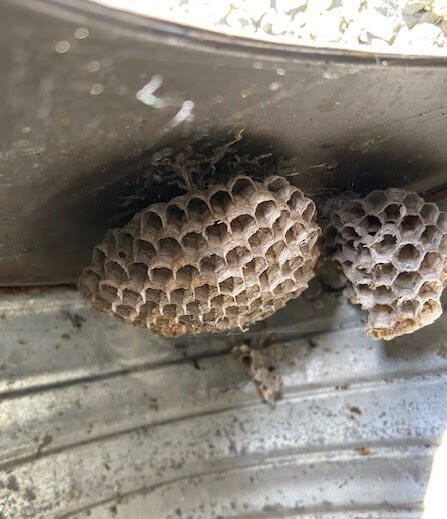Articles
Nothing beats the taste of juicy tomatoes and crisp green beans grown in your own garden. And you don’t need acres of land to learn the joys of vegetable gardening—you can use containers on your patio, deck, or balcony.
The paper wasp is a beneficial insect to have in the garden, especially a vegetable garden! They help prevent insect damage to plants and reduce the need for insecticides.
There are several species of paper wasps and native solitary wasps that are helpful to the gardener. The most often seen is a species known as the European Paper Wasp, that was accidentally introduced to the U.S. in the 1970s. It is now the most common wasp in Washington state.
Paper wasps are predators; they hunt to feed their young. Caterpillars are the wasps’ favorite, so they go after those cabbage white butterfly larvae which are the bane of gardeners growing veggies like cabbage, broccoli, cauliflower and kale! Happily, paper wasps are a less aggressive species, and not apt to sting as they are busily foraging for food.
It is black and yellow, so can be confused with the much more aggressive yellowjacket. It is easiest to tell them apart by the way they fly; paper wasps fly slowly with their legs dangling beneath them. And unlike yellowjackets, paper wasps are not pests at picnics and cookouts. They are only interested in live foods (like caterpillars).
Active from April through September, paper wasps will spend much of their time foraging for the insects they take back to the nest to feed their developing young. The adult wasps will also sometimes sip nectar from flowers for an energy boost. When they do, they are garden pollinators!
Paper wasps live in small colonies that build umbrella-like nests not much bigger than a few inches across. The nests are open, which means the individual cells are clearly exposed. It is typical to see many of these small nests around the home and landscape. The small colony size is one reason paper wasps are less likely to sting. Most individual wasps are out working, leaving very few adults behind to protect the nest.
Paper wasps like warm, rain protected spots for nest-building, such as the eaves on the south side of buildings. They often nest under fence rails. One method to encourage nests near a vegetable garden is to turn empty clay pots upside down in a sunny spot nearby. Paper wasps can use the exposed drainage hole of the pot for access.
A few nests, left undisturbed and in areas where physical contact with humans is unlikely, can produce more than enough wasps to prey on unwanted insects. Give some thought to the location of nests that are being left in place for the benefit of the vegetable garden. Digging, weeding, harvesting or other garden activities right up against the nest will not be appreciated by these otherwise passive wasps.
It’s important to note European paper wasps compete with our native wasps, so nests that are not near the vegetable garden are not particularly helpful.
If you find you need to remove one or more of these small paper wasp nests, choose a time with the coolest temperature possible, such as very early morning. This is when the wasps are most lethargic.
Knock the nest into a container with a tight-fitting lid and place in the freezer for several days to humanely kill the wasps. Because the nests grow in size as the summer progresses, it is best to do this as early in the season as possible.
Paper wasp colonies die out during the winter, with only a few queens hibernating to start brand new colonies the next spring.
All wasps serve important roles in the ecosystem, but some have a well-deserved reputation for bad tempers. The more benign paper wasp can become a useful and acceptable helper in the vegetable garden. Consider leaving a nest or two nearby. Your plants will thank you.
For more information, visit pubs.extension.wsu.edu/the-european-paper-wasp-home-gardening-series.
Cece Fitton has been a Master Gardener volunteer since 2017. She is on the team developing the pollinator garden and wildflower meadow at Woodcock Demonstration Garden.
Lowdown on wasps
Who knew wasps can be beneficial? If you are buzzing for more information, join WSU Extension Regional Horticulture Specialist Laurel Moulton for the Green Thumb Education Series presentation — “Wasps, Hornets and Their Mimics” — from noon-1 p.m. on Thursday, June 22, at the Port Angeles Library, 2210 S. Peabody St.
Source: sequimgazette.com


Leave a Reply